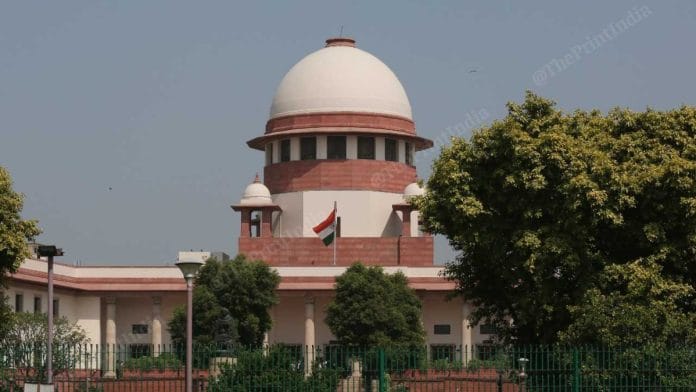New Delhi: The Supreme Court Friday witnessed high drama in a case related to the alleged Chhattisgarh liquor scam that is being probed by the Enforcement Directorate (ED) when additional solicitor general S.V. Raju disowned an affidavit filed by the anti-money laundering agency.
A bench led by Justice Abhay S. Oka was hearing a bail petition filed by former Chhattisgarh excise secretary, Arun Pati Tripathi, when Raju’s statement left the court shocked. Appearing for the federal agency, Raju remarked there was something “fishy” about ED’s affidavit, opposing Tripathi’s bail plea.
He further said the affidavit was “half-baked” and filed without proper vetting. He asked the court to adjourn the matter to next week.
The bench, however, was unconvinced and passed over the case for further hearing. “Worried” by Raju’s statement, it wondered how ED’s advocate-on-record (AoR) could have filed an affidavit without properly vetting it.
To their further surprise, hours later, when the court re-heard the case, Raju took back what he said during the earlier round of discussions and offered to rely on the ED’s affidavit. He even defended the AoR, who appeared before the bench pursuant to its direction, claiming the lawyer was not at fault.
When the bench told Raju that it would not allow him to retract the affidavit, the senior law officer informed the bench that he was ready to argue the case based on the said document.
Also Read: SC grants inheritance rights to ST women via 1875 law, urges Centre to amend their succession laws
The case & what the affidavit says
Tripathi, who has been in jail since August last year, moved the Supreme Court seeking regular bail in the ED’s case related to an alleged scam in the Chhattisgarh liquor policy.
The agency registered its complaint on the basis of two First Information Reports (FIRs) lodged in connection with the alleged scam. While one was registered by the Uttar Pradesh Police, the second was lodged by the Chhattisgarh Police, which launched a probe into corruption allegations soon after the Bharatiya Janata Party (BJP) formed government in the state last year.
The scam allegedly took place between 2019 and 2023, when the Congress was in power and, according to the ED, caused a loss of Rs 2,161 crore to the state exchequer.
The Justice Oka-led bench on 6 January issued notice to ED on Tripathi’s bail plea. In a 50-page response filed two days ago, ED vehemently opposed the bail.
Its affidavit said that documents in the agency’s possession established a well-planned systematic conspiracy, executed by the syndicate to earn illegal commission in the sale and licensing of liquor.
The ED’s affidavit describes the policy, formulated in 2017 under the then BJP government, as one with a “noble objective”, but a change in the government led to its faulty implementation, insinuating that corruption began after Congress took charge of the state.
A syndicate comprising senior civil servants, state politicians and officials of the excise department began operating in Chhattisgarh and Tripathi was chosen by the syndicate to play a crucial role, it alleged.
The affidavit further alleged “massive unprecedented corruption between 2019 and 2023 in multiple ways”, again suggesting that, soon after the BJP government came to power, the policy’s implementation was back on track.
Tripathi, the ED alleged, along with other co-accused, systematically altered the liquor policy as per “whims and fancies and extorted maximum personal benefit for themselves”. Since he was an inside man, he understood all the loopholes and made the policy changes to ensure the entire scam ran without any hitch, ED submitted.
‘Attempt to keep Tripathi in jail’
On Friday when Tripathi’s petition was called out for hearing, Raju, submitted: “There is something hanky-panky as far as my department is concerned. Without consultation, a half-baked affidavit has been filed even before we filed an appearance for it.”
Tripathi’s advocates, senior lawyers Meenakshi Arora and Shishir Prakash objected to Raju’s statement. They alleged it was part of ED’s strategy to keep their client in jail.
Raju, however, remained firm in his opinion. “There is something fishy in the filing of the affidavit. That is what I found yesterday. The affidavit was filed without being vetted by the investigating agency, without even referring to the facts.”
Raju’s stand surprised the bench since the documents are filed by AoR, who are authorised to first vet and then submit the written responses to the court’s registry.
But Raju defended the lawyer and said that he had asked the ED director to institute a departmental enquiry into the matter.
Raju urged the bench to postpone the matter to Tuesday next week, saying he wanted to check the affidavit. “This type of thing should not happen in the department,” Raju told the court.
But the court, which by now was visibly perturbed, declined Raju’s plea and passed over the matter, with a direction to the advocate-on-record to appear before it.
“This affidavit has been filed by the advocate-on-record. And now ED wants to say that it was filed without instructions. How can we accept that,” the bench observed.
When the matter was called out again for a hearing around lunchtime, Raju informed the bench once again defended the advocate-on-record and conceded the latter had filed it on the department’s instructions.
This further bewildered the judges who said they would now not permit the ED to change the contents of its affidavit. Ultimately, Raju agreed to proceed with the matter on the basis of ED’s affidavit.
The court will continue hearing the matter in February.
(Edited by Sanya Mathur)
Also Read: Why SC restrained TM Krishna from claiming award named after MS Subbulakshmi. ‘Added fuel to fire’






